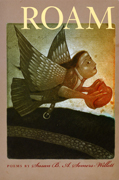
Quiver
(poems) |
The Cultural
Politics of Slam Poetry (criticism) U of Michigan Press, 2009 |
Roam
(poems) Crab Orchard Series, 2006 Southern Illinois U Press |
|
||
Quiver Winner of the 2010 Writers' League of Texas Book Award |
|
Description Reviews of Quiver “Anyone fascinated by what comes of the passionate coupling of science and art will devour this collection of poems. Somers-Willett's poetic imagination plumbs the wonders and mysteries of dark matter, relativity, atomic physics, and natural history with lyricism, reverence, and delight.” “It's no surprise that Somers-Willett would take on science to present the shared boundaries of science and human experience. She has been stretching and breaking boundaries for years—as a spoken word artist, ekphrastic poet, a documentarian, and a literary critic.... Unlike Kimiko Hahn, whose inspiration from her latest collection, Toxic Flora, was influenced by The New York Times science section; Somers-Willett's inspriation is drawn from her first career path, that of a cell biologist, before switching over to creative writing.... Somers-Willett explores science in an illuminating way, with a dedication to the sort of underplayed craft, colloquialism and gentle power so evident in her work.” —Gabrielle David, Phati'tude Literary Magazine “While Quiver calls on diverse fields, you needn’t be a polymath to enjoy the language, formal variety, and profound insight of these beautiful, honed poems....The poems, like the dark matter, sing. They, like vertices in a quiver, connect to each other.” —Jenny Burdge, Indiana Review “Quiver asserts an affinity between the sciences and the erotic as the book’s speakers and subjects question whether some means of study can ultimately lead to a lasting proof for love.... No scientific subject is too complex, no theory too far-fetched for investigation. For Somers-Willett, even dark matter becomes ‘a love story.’ Whether vibrating on earth or in some distant galaxy, every body is atomic.” —Shara Lessley, West Branch Praise for Quiver “The poems in Quiver reverberate with the ravishing and harrowing erotics of the natural world. Somers-Willett's lush meditations praise process, eloquently, as they consider first and last things, figure and ground, the visible and reticent. Science and biography are infused with lyricism in poems at once succulent and accurate, vibrant with mind and rich with substance. In the 19th century, a prophetic Whitman sang the body electric. Here, in a powerfully imaginative group of poems on the Curies, radium opens its mouth ‘to crow / the dawn atomic.’ Such richly observant poems ‘glow in the small moments,’ even as they take on the largest subjects. Susan B.A. Somers-Willett is a marvelously intelligent poet, attentive to the possibilities of nature and language, the reciprocity of all that is.” —Alice Fulton, author of Cascade Experiment “In Susan B.A. Somers-Willett’s Quiver, poetic imagination and scientific theory merge as ‘math enacts speculation’ and ‘the beloved atoms sing.’ Darwin, Oppenheimer, and the Curies appear amid the images and meditations rendered by her generous, yet discerning skill. Somers-Willett is a poet as passionate and inventive as the radical thinkers she counts among her muses. Quiver is a marvel of exacting speculation and song.” —Terrance Hayes, author of Wind in a Box “Quiver is about the connection between the natural world and how we live in it. Whether about physics, relationships, or pure observation, it’s the language of these poems—rich with stunning lyricism, rich with not merely fact, but also many truths—that Susan B.A. Somers-Willett uses to unlock the secrets of this world. She lays out the factors of metaphor and music in surprising ways, and her solution for X is always satisfying, ringing with the thrill of discovery and unvarnished emotion. These gifts are why ‘I will travel the black lines, nearly out of sight…/ I will ride the light’s bending into this inverted world,’ trusting the poet every step of this journey.” —A. Van Jordan, Author of Quantum Lyrics |
|
The
Cultural Politics of Slam Poetry:
|
|||||
Description A veteran of the National Poetry Slam scene for over a decade, Somers-Willett also discusses the emerging popularity of spoken word poetry, exploring the commercial ties between popular verse, mainstream media, and hip-hop music—and their entanglements with the exploitation of black urban culture. Written in a voice that is both intellectual and accessible, The Cultural Politics of Slam Poetry is the first book of criticism dedicated to examining a body of verse that has demanded serious scholarly attention for several years. >> Read the New York Times article “Is Slam in Danger of Going Soft?” Reviews of The Cultural Politics of Slam Poetry “For a lucid and thorough 'real-world' analysis of the movement from the ground-up—including its history, aesthetics, and culture, there is surely no better place to start than Somers-Willett's trailblazing book.” —Jerome Sala, Pleiades Review of Books “While framing her discourse within the work of scholars such as Goffman, Butler, and Austin, Somers-Willett manages to open up an important discussion on both the way in which identity is performed by minoritarian subjects on stage, and how these performances of self are subsequently received by audiences. In this way, the book represents a significant contribution to work on the politics of reception and performance.” —Karen Jaime, e-misférica “Through her examination of the genre, Somers-Willett manages to take the reader through the fairly complicated and nuanced life of a Slam Poet and Slam poetry. In addition, she masterfully dissects how this genre informs our understanding of racial and ethnic identity politics in America.... Somers-Willett produces a well-written, thought-provoking, and an all around good book. It is particularly useful in popular cultural courses, or courses pertaining to African-American culture.” —Matthew Oware, The Western Journal of Black Studies “This book will launch a wave of culturally, socioeconomically, and racially diverse analyses of the poetry slam. It may also pave the way for a heated debate on poetry slam rules in both educational settings and public venues. Considering the relationship between poetry, ethnicity, and poetic forms, it is likely that slam poetry and spoken word can expect to gain as much as they offer by celebrating individuality, ethnic identity, and as Somers-Willett puts it, the ‘shared value of difference’ onstage, backstage, and in the poetry community at large.” —Marie Fleischmann Timbreza, MELUS Journal “[Somers-Willett's] pioneering work on a genre in popular culture reflects themes and concerns that are of great importance to folklorists and in the study of folk poetics and, to a degree, for those studying marginalized communities.... Somers-Willett gives students the basic tools to pursue further research into the performing body of slam poets and an opportunity to examine the broader ethnographic study of a participatory culture in practice at performance event.” —Fernando Orejuela, Journal of Folklore Research “Anyone looking for an introduction to slam poetry will find Somers-Willett to be a knowledgeable, clear-headed guide. The book is scholarly, but its interdisciplinary approach makes it appropriate for non-specialists and undergraduate students alike. (I will definitely be assigning portions of this work the next time I teach slam poetry).... If Somers-Willett is right about the important cultural stakes of this poetry--and I wholeheartedly believe that she is--then literary scholars need to begin addressing these and other difficult questions. We need to bring slam poetry into our classrooms, our critical studies, and, ultimately, our canons.” —Melissa Girard, Poetry & Popular Culture Praise for The Cultural Politics of Slam Poetry “Finally, a clear, accurate, and thoroughly researched examination of slam poetry, a movement begun in 1984 by a mixed bag of nobody poets in Chicago. At conception, slam poetry espoused universal humanistic ideals and a broad spectrum of participants, and especially welcome is the book’s analysis of how commercial marketing forces succeeded in narrowing public perception of slam to the factionalized politics of race and identity. The author's knowledge of American slam at the national level is solid and more authentic than many of the slammers who claim to be.” —Marc Kelly Smith, founder/creator of the International Poetry Slam movement
|
|||||
Roam Winner of the Crab Orchard Series in Poetry Open Competition Award |
|
Description
Reviews of Roam “Somers-Willett wonderfully teeters between subtlety and brashness.... This is a smart collection that nicely underplays a confident, feminist voice in a very real world, where questions of identity and home are written with an often terse self-reflection. Playful without being self-indulgent, there is little emotional relief in these poems. This poet is tough. And to draw thematically from the cast of characters she has put together, it would not be inappropriate to suggest this book of poems gets to the heart of the ancient command: Know thyself." —Mark Eleveld, Chicago Sun-Times “Somers-Willett’s poems become an act
of active reading, a game where you connect the meanings between
the title and each line, each line to each other line, and those
lines to other people’s poems.... Susan B. A. Somers-Willett has written a beautiful,
sad, and passionate book. The poems in Roam force me to admit, like Jeanne, "my beautiful world —Andrew Kozma, American Book Review Praise for Roam “Susan Somers-Willett’s Roam is not so much a debut as a laying of claim: Poetry is her birthright by virtue of a spiritual bloodline that makes her the child of Whitman and Rukeyser. On these roads of our country, she tells us, the soul is a beautiful thing that can, after so much horror and mischief are unearthed, grid the land with compassion. Championing gnosis rather than decrying lost innocence, her poems balance wit and sobriety, lyricism and the spondees of truth. I am thrilled by the joy she conjures, and the grace of her accomplishment.” —Khaled Mattawa, author of Zodiac of Echoes “There’s a breathtaking, sly intellect at work in the luscious poems of Roam. Susan B. A. Somers-Willett spins an elegant geography of vast terrains and intricate histories. Her poems make unexpected landings and linkages everywhere. And I’ll bet you want to keep reading “In Memory of a Girl” over and over again as long as you live. I do.” —Naomi Shihab Nye, author of You & Yours “Deftly crafted and threaded with a fierce lyricism, Roam is Somers-Willett's tour-de-force, a vibrant collection that will stamp the genre with her unflinching signature. A moving cycle of poems chronicling the trial of Joan of Arc provides the pulse for this volume, but the poet goes on to rip the veneer from a varied range of topics. A boxer's wife bemoans shifts of mind and muscle. Even an interstate highway takes on voice. It's immensely gratifying to see such a primal connection to the language, to sense light beneath each lean stanza, to witness one woman shout out from the muddle of cookie-cutter poetics. Roam is a revolution.” —Patricia Smith, author of
Teahouse of the Almighty, Request a Review Copy
|
|




